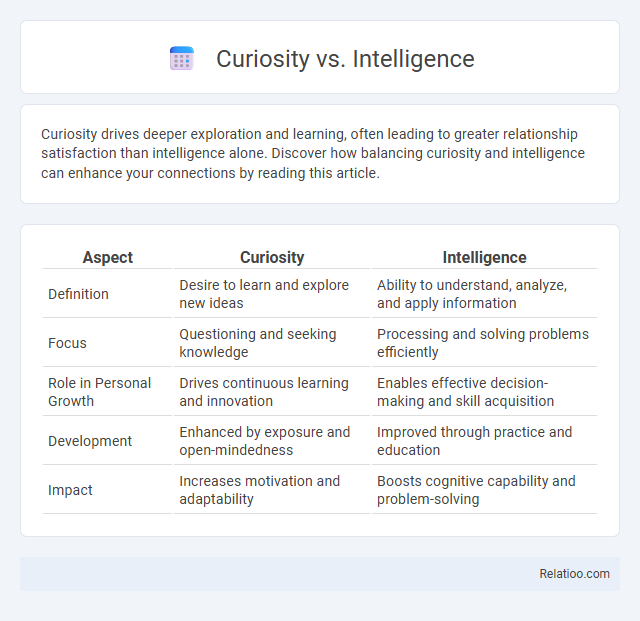Curiosity drives deeper exploration and learning, often leading to greater relationship satisfaction than intelligence alone. Discover how balancing curiosity and intelligence can enhance your connections by reading this article.
Table of Comparison
| Aspect | Curiosity | Intelligence |
|---|---|---|
| Definition | Desire to learn and explore new ideas | Ability to understand, analyze, and apply information |
| Focus | Questioning and seeking knowledge | Processing and solving problems efficiently |
| Role in Personal Growth | Drives continuous learning and innovation | Enables effective decision-making and skill acquisition |
| Development | Enhanced by exposure and open-mindedness | Improved through practice and education |
| Impact | Increases motivation and adaptability | Boosts cognitive capability and problem-solving |
Defining Curiosity and Intelligence
Curiosity is the intrinsic desire to explore, discover, and seek new information, driving individuals to ask questions and pursue knowledge beyond immediate understanding. Intelligence refers to the ability to process, analyze, and apply information effectively to solve problems and adapt to changing situations. Your cognitive growth depends on balancing curiosity's motivation to learn with intelligence's capacity to comprehend and utilize that knowledge efficiently.
The Science Behind Curiosity
Curiosity triggers complex neural pathways in the brain, primarily activating the hippocampus and dopaminergic system to enhance learning and memory formation. Studies reveal that curiosity-driven exploration improves cognitive flexibility and problem-solving skills, highlighting its distinct role from raw intelligence or sheer knowledge accumulation. Your brain leverages curiosity as a powerful mechanism to motivate information-seeking behavior, ultimately boosting intellectual growth and adaptive thinking.
How Intelligence is Measured
Intelligence is measured through various standardized tests such as IQ tests, which assess cognitive abilities including logical reasoning, problem-solving, and verbal comprehension. Your curiosity drives the desire to learn and explore new information, but intelligence quantifies your capacity to understand and apply knowledge effectively. Unlike curiosity, which fuels motivation, intelligence provides a benchmark for evaluating mental aptitude and potential.
Curiosity’s Role in Learning
Curiosity drives your desire to explore and acquire new knowledge, acting as a key motivator in the learning process. Unlike intelligence, which measures your cognitive abilities, curiosity fuels engagement and deepens understanding by encouraging active inquiry and experimentation. By fostering curiosity, learners can enhance problem-solving skills and retain information more effectively, making it an essential element in lifelong education.
Intelligence and Problem-Solving
Intelligence plays a critical role in problem-solving by enabling individuals to analyze complex situations, identify patterns, and devise effective strategies for resolution. While curiosity drives the desire to explore and learn, intelligence provides the cognitive capacity to process information and apply knowledge logically. High intelligence enhances problem-solving skills by improving reasoning, abstract thinking, and decision-making under uncertain conditions.
Differences Between Curious and Intelligent Minds
Curious minds actively seek new knowledge and experiences driven by a desire to explore unknown concepts, while intelligent minds process and apply information efficiently to solve problems and make decisions. Curiosity fuels innovation and learning by encouraging questioning and discovery, whereas intelligence emphasizes reasoning, memory, and pattern recognition to understand complex systems. The key difference lies in curiosity's motivational role in pursuing knowledge versus intelligence's cognitive ability to analyze and synthesize information.
Can Curiosity Boost Intelligence?
Curiosity serves as a powerful catalyst for enhancing your intelligence by driving exploration, learning, and problem-solving. Engaging your natural inquisitiveness stimulates neural pathways, leading to improved cognitive functions and knowledge retention. Fostering curiosity can effectively boost your intellectual capacity beyond innate intelligence levels.
Real-World Examples: Curiosity vs Intelligence
Curiosity drives innovation in fields like scientific research, where individuals keen on exploring unknown phenomena often make groundbreaking discoveries despite not having the highest measured intelligence. For example, Thomas Edison's relentless curiosity and experimentation led to the invention of the practical electric light bulb, showcasing how curiosity can compensate for formal intelligence levels. In contrast, intelligence enables quick problem-solving and logical reasoning, as demonstrated by mathematicians who use cognitive prowess to solve complex equations, but without curiosity, their impact may be limited to existing knowledge boundaries.
Fostering Curiosity and Intelligence in Daily Life
Fostering curiosity and intelligence in daily life involves engaging in activities that challenge the mind and encourage exploration, such as reading diverse topics, solving puzzles, and asking open-ended questions. Creating an environment rich in stimuli, including access to educational resources and opportunities for hands-on learning, enhances cognitive growth and stimulates intellectual curiosity. Regular practice of reflection and critical thinking helps integrate new knowledge, promoting both curiosity and intelligence effectively.
The Future Impact of Curiosity and Intelligence
Curiosity fuels innovation by driving your exploration of new ideas and solutions, while intelligence processes and applies this knowledge effectively. Together, curiosity and intelligence shape the future by accelerating breakthroughs in technology, science, and problem-solving capabilities. Prioritizing both traits in education and workplaces ensures sustained personal growth and societal advancement.

Infographic: Curiosity vs Intelligence
 relatioo.com
relatioo.com